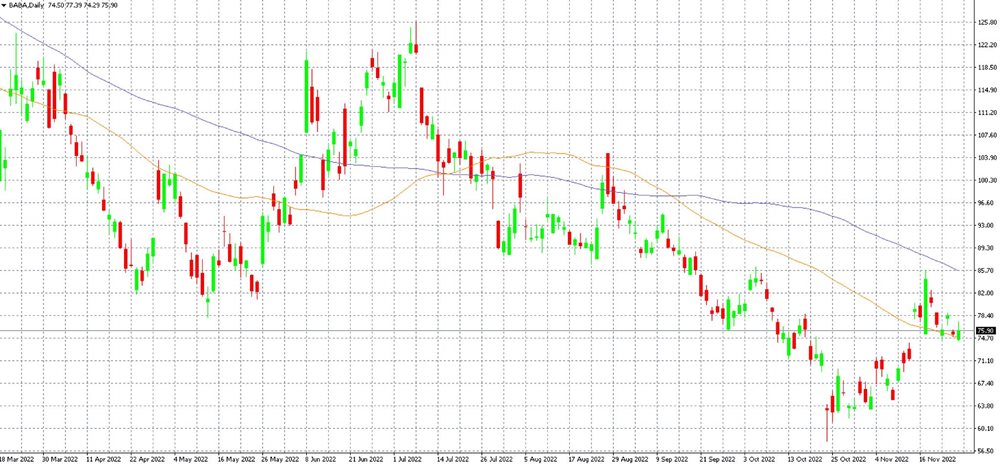Alibaba - the Chinese curse continues
Alibaba shares have long been one of the most popular among Purple Trading clients. Looking at the chart below, it is no wonder. Alibaba shares are a nightmare for any value investor who buys and then holds the stock for the long term. For traders who can take advantage of the volatility and trade both ways, however, it can be heaven on earth. In fact, this stock is down nearly 40% since the beginning of the year, which is a really significant move. However, a look at the comparison to the all-time high is considerably more dismal.
Over the past month, however, Alibaba has done quite well, with its shares gaining nearly 20%. What are the reasons for this turnaround? And is it the right time to buy?

Alibaba shares on the MT4 platform on the D1 timeframe along with the 50 and 100 day moving averages
The last month has been full of mixed news from Alibaba's perspective. The company posted relatively solid third-quarter results. Earnings per share rose 5% year-over-year to $1.82, and Alibaba also announced an additional $15 billion in share repurchases. These are expected to add to an earlier plan to buy back USD 25 billion worth of shares. A more dismal view was the sales, which fell 6% year-on-year to USD 29.1 billion (at least the cloud section is doing well, with sales up 10% year-on-year to USD 1.59 billion).
This is the third consecutive quarter-on-quarter revenue decline, which is alarming for an e-commerce company. However, this unfortunate streak should be broken in the fourth quarter, which is traditionally the best quarter. In addition, Alibaba's traditional Singles Day (11/11), which is a sales holiday and brings in huge sales every year, is over. Although the company did not disclose exact figures, the volume of goods sold should be at a similar level to last year (around USD 80 billion).
However, the world’s most populous country has one big problem to solve right now. China is still fighting in vain against the coronavirus and the daily number of new infections exceeds 30,000. This is the most since the beginning of the pandemic. China is fighting the covid with strict measures and some cities have even been closed for over 100 days. The closures also affect important industrial areas, and not only production but also demand is suffering. China is currently facing wild protests, which are said to be the worst since 1989. This could significantly depress the entire Chinese market. We must also not forget the ongoing geopolitical tensions between China and the West. The situation around Taiwan is still tense and the US has even banned the export of state-of-the-art chips to China. Given the current risks, Alibaba shares are thus suitable for speculation at most and not for long-term holding.